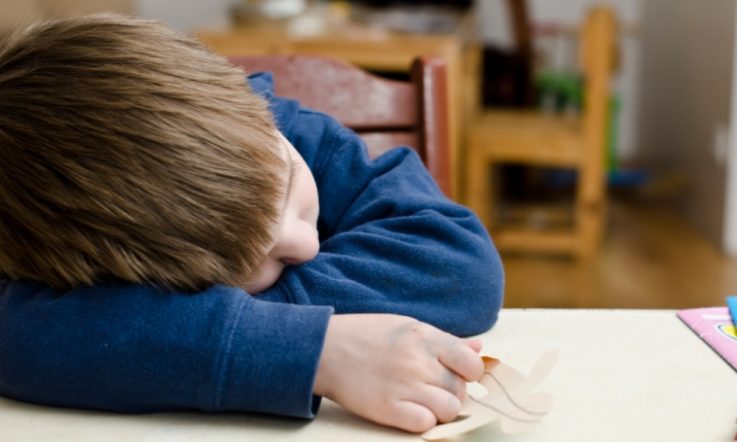Thank you for downloading this podcast from Teacher magazine – I'm Jo Earp and you're listening to Episode 18 of The Research Files. The Australian Child Wellbeing Project involves a team of researchers from Flinders University, the University of New South Wales and the Australian Council for Educational Research. Once of its key messages is the importance of capturing student voice. In fact, its final report reads: 'Young people are experts in their lives. They were the key informants in this study, and should be the key informants on policies affecting them.'
Jo Earp: Lead researcher, Associate Professor Gerry Redmond of Flinders University, joins me now to talk about the project. Gerry, welcome to The Research Files. Let's start with that message - the importance of student voice. The report notes the voices of students have been largely absent from research actually about them. Why do you think this is?
Gerry Redmond: Well I suppose, traditionally children have been seen as best seen and not heard. And, I think we have still this lingering expectation that children really don't have much of value to say or to contribute.
This is increasingly challenged. For example, the [United Nations] Convention on the Rights of the Child - which we all subscribe to, which the government subscribes to – recognises that children need to be listened to in matters concerning them. But it's taken a long time for that message to actually get through and there's a lot of competition because, for example, in the space of schools and the space of health you've got all these experts. You've got teachers, professionals etcetera, you've got parents who claim to speak for children.
So, there's a lot of competing voices there and they all have legitimate things to say, but that doesn't mean that children's voices themselves should be crowded out.
JE: Now, this is the Australian Child Wellbeing Project. Students are quite clearly at the centre of this research project. Just take us through how you and your team went about doing that.
GR: Okay, we'll what we tried to do from the very start, you're absolutely right, is put young people themselves at the centre.
So first of all, what we did was we went around and talked to young people in small groups – mostly young people from what you might call ‘marginalised backgrounds', such as Indigenous young people, young people with a disability, young people from materially disadvantaged backgrounds.
And we asked them very simply ‘What's important in your lives?', ‘What do you think is important?' and we used their answers in order to develop a survey questionnaire, a survey instrument, that we were then able to conduct across a nationally representative sample of young people in Australia.
So, the idea was really that we would base our survey – which is not really a ‘child' instrument in the sense that we designed the survey – on what children and young people themselves said was important. We tried in particular to ensure that the voices of children and young people who are often seen as marginalised were represented in this; that they would see themselves in the survey and that they would feel comfortable in completing the survey.
For example, we ensured that there were audio recordings of all the questions so that young people were able to listen to the questions if they had reading difficulties. They didn't have to read them out, they could listen to the questions, they answered the questions by clicking on a button – it was all done online. So, what we tried to do was make it as user-friendly as possible to marginalised young people, as well as to Australian young people in general, and as well as that base it on the ideas of young people themselves.
JE: Now, this study involved, as you mentioned, a follow-up survey – and that was students in Years 4, 6 and 8, (5400 students) that's eight- to 14-year-olds. To quote another of the report's key messages back to you: 'The middle years are important. There is a lot going on in young people's lives at this time, and policy needs to pay attention to more than their academic achievement.' Again, why has middle years been a neglected area?
GR: It's an interesting question. You may note that over the last 15 or 20 years or so in Australia there's been a lot of focus on the early years, about the plasticity of the brain in early childhood and this is a time when things can happen, when young people have their biggest developmental spurts, and if you set them right in the early years they'll be okay right through their lives. So therefore there's been a lot of focus in the last 15 to 20 years on early years education, on quality childcare, etcetera.
There's always been a lot of focus on adolescence because it's a time of risk, when young people take risks and they get in trouble with the law, and they compromise their health in various ways – so there's also been a bit of a focus on adolescence in one way or the other. But, in the middle there has been very little and I think the reason is because it's been seen that not much is happening in this time – it's just a time when children go to school, nearly all the children are at school, they're not out on the streets causing problems. The assumption is that if you have sorted them out developmentally in the early years, well they'll travel fine for the middle years. But, increasingly this is found to be not the case.
What surprises me is if you ask any teacher or professional who deals with children and young people, I reckon they already know this. You see, for example, in the transition from primary school to secondary school huge numbers of children find it difficult. But now you also see it in new medical research which shows that the onset of puberty starts much earlier than people really thought, much earlier than visible signs of puberty, and that these changes are associated with changes in outlook, with changes in attitude, with a lot of other changes that can impact on a whole range of different areas of young peoples' lives.
So, it's becoming increasingly important that we do need to focus a lot more on the middle years than we have to date.
JE: Finally then, before you go, moving onto the results - what are some of the findings coming from this work and the implications for classroom practitioners?
GR: Okay, now, when we're talking about wellbeing this is often seen as a bit of nebulous term, but what we've tried to do is make the concept of wellbeing as concrete as possible. When we're talking about wellbeing, what we're talking about is the relationship between concrete experiences of young people and how they think about these experiences, or how it impacts on them.
So, for example, we talk about hunger. We talk about the relationship between hunger and bullying; young people who go to school or bed hungry are much more likely to be bullied than young people who do not go to school or bed hungry. And this is an indicator, if you like, of low wellbeing.
We talk about missing school – young people who are bullied are much more likely to miss school than young people who are not bullied. And, again, this is a clear indicator of low wellbeing, not just in one area in terms of missing out on education, but also in another area in terms of experience of victimisation.
Similarly, young people with small support networks, who don't have a large number of adults and other people who they can rely on, who they feel close to … they have worse health problems, they are much more likely to be bullied at school [and they have a] much lower view of their whole lives than young people with larger support networks. And this, then, becomes really important; it raises the question of ‘How can policy, how can schools, how can communities, ensure that children have adequate support networks so that they have people to call on when they need help?'
The whole point of looking at wellbeing is to link up these different findings and different domains. So, sure a lot of what goes on in young people's lives at this stage happens in schools, but a lot of what happens outside of the school impacts also on what goes on inside in the schools. And when we're thinking about policy solutions, we need to think of the whole child, or the whole student, not just the part of the student that attends school between 9am and 3pm every day.
JE: Now, there's a lot more detail, obviously, in the final report which you've recently released and we'll include a link on our website. For now, Associate Professor Gerry Redmond, thanks very much for sharing your work with The Research Files.
GR: Very glad to, thank you.
You've been listening to an episode of The Research Files, from Teacher magazine. To download all of our podcasts for free, visit acer.ac/teacheritunes or www.soundcloud.com/teacher-acer. To find out more about the research discussed in this podcast, and to access the latest articles, videos and infographics visit www.teachermagazine.com.au
References
Redmond, G., Skattebol, J. et al (2016). Are the kids alright? Young Australians in their middle years: Final report of the Australian Child Wellbeing Project. Flinders University, University of New South Wales and Australian Council for Educational Research.
When developing in-school wellbeing policies, do you ask your students what's important to them?
When it comes to wellbeing, what support networks do you have in place for students?
To find out more about the Australian Child Wellbeing Project click on the link.



